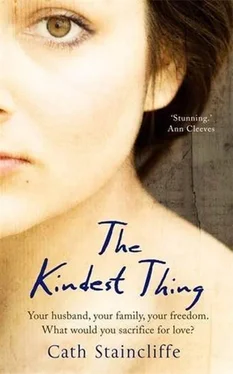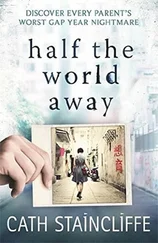The clerk repeats the charge against me to the jury.
The judge explains to the jury and the court that we will hear first from the prosecution who will make an opening statement. He consults with the barristers about a probable time to break for lunch. The exchanges are eminently civil and the reality that I am in the dock for murder seems preposterous set against this mannered chat. I detect warmth in the judge’s voice, perhaps down to those Lancashire vowels, and a benign paternalism in his manner. It shouldn’t make a difference: he is meant to be impartial, his role simply to apply the processes of the law, but had he seemed waspish or frosty I would have been more fearful. After all, the jurors will look to him for guidance, they will drink in all his non-verbal communication. And if I am not acquitted he will set my sentence.
The prosecuting barrister stands up and introduces herself. ‘Your Honour, ladies and gentlemen of the jury, my learned friends, I, Briony Webber, appear for the prosecution, and my learned friend, Mr John Latimer, appears for the defence.’
I guess she is in her early forties. She’s extremely tall, like a seedling gone rampant, but she carries it well. No stoop. Her wig looks fresh and tidy, whereas Mr Latimer’s has the appearance of a scrap of sheep’s wool caught on barbed wire.
Miss Webber has a clear voice, a fluency with words as she lays out my crime for the court.
‘In the dock today stands Deborah Shelley. She is here accused of the gravest crime, that of murder. The murder of her husband Neil, a loving son, a caring father, a valued colleague. The case for the prosecution is that Deborah Shelley set out to kill Neil Draper, in the full and clear knowledge that what she was doing was wrong. We shall show how she attempted to cover up her crime, lying to her family and lying to the police. We shall show how, faced with incontrovertible evidence that she had poisoned and then suffocated her husband, she continued to lie. Neil Draper was unwell. He suffered from motor neurone disease. He had a limited life expectancy. It is our contention that Neil Draper asked his wife to help him end his life prematurely and that she complied. We shall call witnesses who will testify that Deborah Shelley was functioning well in the days before this tragic death, witnesses who will report her being in good spirits, able to socialize, to work. We will call a psychiatric expert who has examined Ms Shelley and who will tell you that the defence of diminished responsibility is a sham. Ms Shelley knew exactly what she was doing that day last June.’
She gives the word ‘Ms’ a little buzz, a hornet’s touch.
‘She set out to end Neil Draper’s life and she succeeded. She then covered her tracks, employed deceit and a web of lies to try to convince the world that this was a natural death. There was nothing natural about this death, there was nothing natural in her behaviour. This woman lied to her own children, to the parents of the man she killed, to the authorities, and she persists in her lies even as she stands before you today.’
Holding my head high, fighting the urge to bow, aware of the tension in my throat and my jaw, I watch the jury, their eyes flicking from the prosecutor to me. Examining my hair, my clothes, making assessments already. Forming first impressions. Snotty cow, not even a Mrs, unnatural, how could she do that?
The day the magistrates refused me bail and remanded me to Styal, I rang home again. The desire to hear their voices, to make sure they were coping, was all-consuming. Sophie answered the phone.
‘Sophie, it’s Mum. Are you all right, darling?’
There was a pause and then she said in a low, trembly voice, ‘You shouldn’t have done it, Mum.’
My heart racketed in my chest. I felt the blood drain from my cheeks and the cold steal into my bowels. ‘Sophie, I never meant to hurt-’
There was a clatter as she let go of the phone. She believed what they were saying. She trusted them, not me. I longed to call her back to the phone, to try and explain. Her censure was understandable: she’d adored her father and now she thought I had taken him away from her. I felt unsteady, the love and concern I’d anticipated from Sophie snatched away. The chance we might console each other shattered.
A few seconds later, Adam came on. ‘Mum?’ He was subdued.
‘Adam, I’m sorry for all this. I need you to be strong now, look after yourself.’
‘Yeah.’
‘You can go to Grandma and Grandpa’s.’
‘I’ll stay. Sophie’s going.’
I’d a mad image of Adam opening up the place for a house party. It’d be great weather for it, tents in the garden and a barbecue, giant spliffs and too much booze.
‘Talk to Jane, if you need anything.’
‘Cool. Can I come and see you?’
I couldn’t speak for a moment. Tears burned the back of my eyes. I didn’t want to break down on the phone, didn’t want him to have to cope with that on top of everything else. ‘Yes, please. I’ll find out what we have to do. You’ll need to go shopping – make sure you eat something.’
‘Course.’ There was a pause. Then he went on, ‘ Jonty’s going to this festival in Spain – there’s a load of them going. I…’ He offered it as something to talk about, then realized it might seem tactless.
‘That sounds great. You thinking of going?’
‘Maybe.’
‘When is it?’
‘Middle of August.’
‘Good.’ I’ll still be in here, I thought. Ms Gleason had told me it would be between six months and a year till my trial started. ‘You could take the little tent.’
‘Yeah.’
‘Well, I’d better go. I love you. I’ll ring you about the visit.’
‘Cool.’
‘Bye-bye.’ My hand ached from gripping the phone.
That night as I lay in my bed, Sophie’s words tore through me, again and again. You shouldn’t have done it, Mum.
The prison isn’t one big building, as I’d imagined. Instead two rows of large red-brick villas slope down avenues lined with oak and lime and beech trees towards the wing at the bottom. Most women live in the houses, which were built as Victorian orphanages. Nowadays the villas all take their names from venerable women, good role models for us: Brontë, Gaskell, Pankhurst. Though when I think about it Pankhurst spent quite a bit of time behind bars, being force-fed for her trouble.
The more dangerous prisoners, those with chronic addiction problems and those in for the most serious offences, live on the wing. Although my charge was up there with the worst, once I had been assessed and deemed to pose no threat to the other women, I was allocated a room in one of the houses near the bottom of the hill close to the wing.
The majority of the women ‘pad up’, two or four to a cell, in the houses. When they sent me to Shapley House – this villa is named after a pioneering radio broadcaster who lived in Manchester – I was put in one of the small single rooms, a privilege, and I was hugely relieved that I didn’t have to put up with someone else’s taste in television night after night, that I didn’t have to lie awake listening to another woman breathe and dream.
We share a bathroom, one to each floor, and I can’t get used to sharing with strangers, never time to indulge in a long shower or a hot soak, someone always knocking on the door. I dart in and out when I have to and never linger. The single cell gives me the option to retreat. That’s all I want to do. To withdraw into my shell like a hermit crab. To creep back along the crevices of memory.
My ‘pad’, as I learned to call it, measures ten foot by eight. Beneath the protector, the mattress is plastered with graffiti, crude and poignant: Cilla4Shawn , I suck cock , help me , Kimberley Smith died age 3 my angel in heaven. There is a moulded block covered with a speckled rubber coating for the mattress to rest on. I once used some of the same material for a maternity unit. It copes well with heavy human traffic, is fireproof, will easily repel blood or urine or vomit and withstands accidental or malicious damage. An important aspect in prison. My pad also has a set of built-in shelves and a cupboard made of the same tough material, a chair, a telly and a sink. Its redeeming feature is the big lime tree outside the window. Its limbs sashay in the wind. I lie on my bed and gaze at it. Listen to the rooks cawing, the ‘teacher teacher’ song of great tits and the roar of jets. We are close to the airport, below the flight path, and the planes overhead are a reminder of freedom, of escape, of holidays. And beyond all those sounds are the haunting calls of women yelling from the wing. Like a chorus of sergeant majors, their plaintive conversations bellow across the spaces between the cells, between the wing and the houses. That sound more than anything is Styal. I can never make out the words. No one ever calls for me. But through the mangled yells and shouts, news travels: of private affairs and public tragedies. Of the woman who set her hair on fire and the one who’s got a release date and the one whose child has been taken away in the mother and baby unit.
Читать дальше












